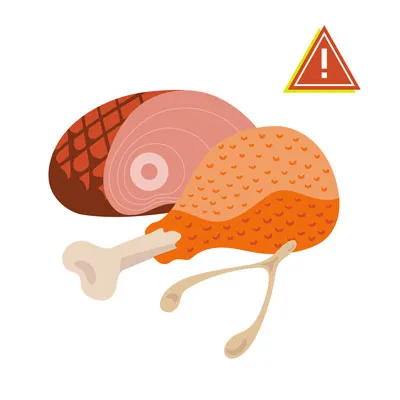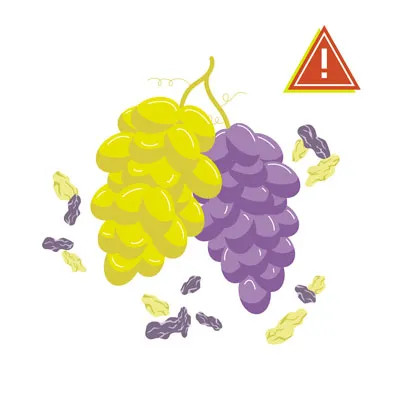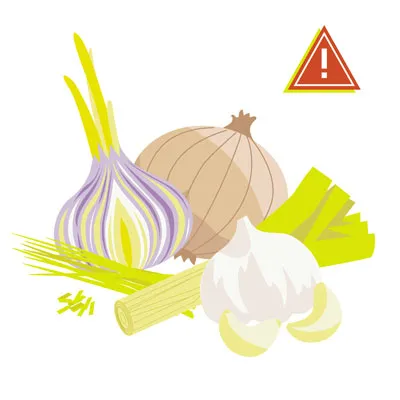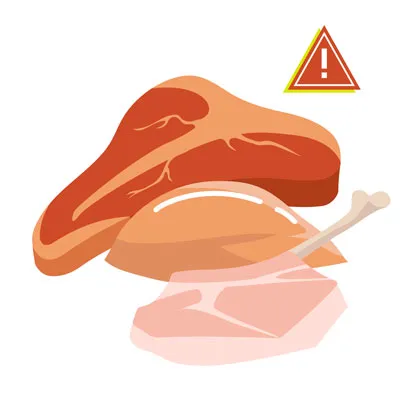As a loving dog owner, you want to ensure your furry friend is healthy and happy, and that often means sharing a piece of your meal. However, many common human foods, especially certain types of meat, can be highly toxic or harmful to dogs. Pet poisonings are a significant concern, with hundreds of thousands of incidents reported annually in the United States alone. Knowing exactly what meat your dog should avoid is crucial for their safety and well-being. This guide from Dog Care Story will serve as your essential resource to help you keep your canine companion safe and sound, particularly regarding meat and other potentially dangerous human foods. For a broader perspective on safe and unsafe foods, explore our detailed article on what food is good and bad for dogs.
Understanding Why Certain Foods Are Toxic to Dogs
It’s natural to wonder why dogs can’t eat everything we do. The primary reason lies in the fundamental differences between human and canine digestion and metabolism. A dog’s body processes certain substances very differently, making some foods perfectly safe for us but dangerous, or even fatal, for them. For instance, compounds like theobromine in chocolate or specific toxins in certain fruits are metabolized much slower by dogs, leading to a rapid build-up in their system that can cause severe illness.
Furthermore, food toxicity can vary depending on your dog’s size, breed, and overall health condition. A small amount of a toxic substance might have a mild effect on a large dog but could be life-threatening for a tiny breed. This highlights the importance of always consulting your veterinarian if you have any questions or concerns about what your dog can and cannot eat.
The Meats Dogs Must Never Eat
When focusing on the question, “What Meat Should All Dogs Avoid?”, certain categories immediately come to mind due to their high fat content, potential for bacterial contamination, or the danger posed by bones. Avoiding these specific types of meat is paramount for your dog’s health.
Fatty Cuts of Meat, Ham, and Poultry Skin
While lean, cooked meat can be a healthy treat in moderation, fatty cuts of meat, ham, and poultry skin (like chicken or turkey skin) are particularly bad for dogs. These items are exceptionally high in fat, which can lead to a serious and painful condition known as acute pancreatitis. Pancreatitis is an inflammation of the pancreas that can be life-threatening and comes with severe complications, including intense abdominal pain, vomiting, diarrhea, and lethargy. It’s always safer to discard these fatty scraps rather than offering them to your pet.
Raw or Undercooked Meat and Bones
Another critical answer to what meat all dogs should avoid is raw or undercooked meat. Many pet owners are tempted by the idea of a “raw diet,” but feeding your dog raw meat carries significant risks. Raw meat can harbor dangerous bacteria such as Salmonella and E. coli, which can cause severe gastrointestinal illness in dogs, just as it can in humans. These bacteria can lead to symptoms like vomiting, diarrhea, lethargy, and even more severe conditions.
Beyond bacterial concerns, feeding raw or cooked bones is also highly problematic. While many envision dogs happily gnawing on bones, splintered bones (especially from poultry like chicken or turkey) can cause severe internal damage. They can obstruct the bowels, or perforate the stomach or intestines, leading to fatal abdominal infections. Even larger, seemingly safe bones can pose a choking hazard or damage teeth. It’s best to steer clear of bones entirely to ensure your dog’s safety. For more information on safe chewing options, consider reading our article on what bones should i give my dog.
 Chicken & Turkey Skin, Ham, & Other Fatty Cuts of MeatA close-up image of various fatty cuts of meat, including chicken skin and ham, highlighting items dogs should avoid due to high-fat content.
Chicken & Turkey Skin, Ham, & Other Fatty Cuts of MeatA close-up image of various fatty cuts of meat, including chicken skin and ham, highlighting items dogs should avoid due to high-fat content.
Other Common Foods Toxic to Dogs
While the focus here is on meat, it’s essential to understand that many other common human foods pose significant risks to dogs. Being aware of this broader list can prevent accidental poisonings and ensure your dog’s continued health.
Chocolate and Caffeine
One of the most widely known toxic foods for dogs is chocolate. Chocolate contains theobromine and caffeine, both of which are methylxanthines. Dogs metabolize these substances much slower than humans, leading to their toxic accumulation. The darker the chocolate, the higher the concentration of theobromine, making baker’s chocolate and dark chocolate particularly dangerous. Symptoms can range from hyperactivity, vomiting, and diarrhea to abnormal heart rhythms, pancreatitis, and seizures. Any amount of chocolate ingestion warrants an immediate call to your veterinarian. Similarly, caffeine found in coffee, tea, energy drinks, and coffee grounds can cause severe symptoms including vomiting, diarrhea, seizures, and irregular heartbeats.
Grapes, Raisins, and Fruit Pits
Grapes and raisins are notorious for causing acute kidney failure in dogs, even in small quantities. The exact mechanism of their toxicity is still being researched, but it’s believed that tartaric acid plays a significant role. Symptoms often include vomiting, diarrhea, lethargy, decreased appetite, and changes in urination. Additionally, fruit pits from apples, apricots, cherries, and plums contain cyanide, which is toxic. While small amounts of apple flesh without seeds are generally safe, it’s best to avoid the core and seeds entirely. Pits can also cause gastrointestinal obstruction.
 Grapes & RaisinsA cluster of fresh red and green grapes alongside a bowl of raisins, visually representing these toxic fruits for dogs.
Grapes & RaisinsA cluster of fresh red and green grapes alongside a bowl of raisins, visually representing these toxic fruits for dogs.
Onions, Garlic, Chives, and Leeks
All members of the allium family—onions, garlic, chives, and leeks—are highly toxic to dogs. These foods contain compounds called sulfoxides and disulfides that can damage a dog’s red blood cells, leading to hemolytic anemia. This condition can cause weakness, lethargy, pale gums, and even collapse. Onion and garlic powders, often found in prepared foods, are also dangerous. Certain Japanese breeds like Akitas and Shiba Inus are particularly sensitive, but all dogs are at risk.
 Onions, Garlic, Chives, & LeeksA collection of various onions, garlic bulbs, and fresh chives and leeks, highlighting these common kitchen ingredients that are toxic to dogs.
Onions, Garlic, Chives, & LeeksA collection of various onions, garlic bulbs, and fresh chives and leeks, highlighting these common kitchen ingredients that are toxic to dogs.
Xylitol (Artificial Sweeteners)
Xylitol is a sugar substitute found in many sugar-free products, including gum, candy, baked goods, and even some peanut butters. In dogs, xylitol causes a rapid and severe drop in blood sugar (hypoglycemia) within minutes of ingestion, leading to weakness, disorientation, and seizures. In higher doses, it can also cause liver failure. Even a small amount, such as that found in a few pieces of gum, can be fatal for a medium-sized dog. Always check labels for xylitol before sharing any human food with your pet.
Macadamia Nuts and Other Nuts
Macadamia nuts are highly toxic to dogs, causing symptoms like weakness, tremors, vomiting, fever, and hind limb paralysis. Even a small handful can lead to severe poisoning in a small dog. While other nuts like almonds and pistachios are not inherently toxic, they can pose choking hazards or cause gastrointestinal upset due to their high fat content, potentially leading to pancreatitis. Flavored or spiced nuts should also be avoided due to added salt and seasonings.
Alcohol
Even small amounts of alcohol can be extremely dangerous, and potentially fatal, for dogs. Their smaller size means alcohol can have a much more potent and rapid effect. Symptoms of alcohol poisoning in dogs mirror those in humans, including vomiting, disorientation, breathing difficulties, coma, and even death. Keep all alcoholic beverages, and foods containing alcohol, strictly out of your dog’s reach.
Yeast and Raw Dough
Raw yeast dough is a double threat to dogs. First, the dough can expand significantly in their warm stomach, causing severe pain, bloating, and potentially life-threatening gastric torsion or rupture. Second, the yeast and sugar in the raw dough ferment, producing alcohol, which can lead to alcohol poisoning. This combination makes raw dough an emergency situation that requires immediate veterinary attention.
Salt and Spicy Foods
Excessive salt intake can disrupt the fluid balance in a dog’s cells, leading to sodium ion poisoning. Symptoms include extreme thirst, frequent urination, vomiting, diarrhea, tremors, seizures, and even coma. Avoid giving dogs salty snacks like potato chips, pretzels, or foods with rock salt. Spicy foods can also cause severe gastrointestinal distress, leading to vomiting, diarrhea, stomach ulcers, and general discomfort for your pup.
Certain Fruits and Vegetables
While many fruits and vegetables are safe, some are definitely on the “avoid” list. Avocados contain persin, which can be toxic to some animals, and the large pit poses a significant choking hazard and can cause gastrointestinal obstruction. Rhubarb and star fruit contain soluble calcium oxalate crystals that can bind with calcium in the body, potentially leading to a dangerous drop in calcium levels and kidney failure if ingested in large quantities. Green parts of tomato plants and unripe, green tomatoes contain solanine, which is toxic, as do raw potatoes.
Milk and Dairy Products
Many dogs are lactose intolerant, meaning they lack the enzyme needed to properly digest milk sugar (lactose). Consuming milk or dairy products can lead to digestive upset, including diarrhea and gas. While some dogs might tolerate small amounts of certain dairy products like low-fat cheese, it’s generally safer to avoid them, especially high-fat varieties and sugary treats like ice cream.
Nutmeg and Cinnamon
Nutmeg contains myristicin, a compound that can cause hallucinations, disorientation, increased heart rate, and severe vomiting in dogs, especially in high doses or for smaller dogs. Cinnamon, while not strictly toxic, can cause irritation to a dog’s mouth and digestive tract. In larger quantities, it can also lead to a dangerous drop in blood sugar.
Tobacco
Any product containing nicotine is highly dangerous for dogs. Ingestion of cigarettes, cigarette butts, cigars, or nicotine patches can cause a range of severe symptoms including vomiting, diarrhea, agitation, rapid breathing, abnormal heart rate, muscle weakness, seizures, and even coma. Immediate veterinary care is essential if your dog ingests tobacco.
Mushrooms
It is best to treat all wild mushrooms as potentially toxic to dogs. Some mushroom species contain various toxins that can cause severe kidney and liver failure, vomiting, diarrhea, hallucinations, and damage to red blood cells. Even store-bought white button mushrooms, while generally considered safe if washed, are best avoided unless you are absolutely certain of their safety.
Flavored and Seltzer Water
Stick to plain, fresh water for your dog. Flavored and seltzer waters can contain added sugars, artificial sweeteners like xylitol, or excessive salt, all of which are harmful to dogs. Plain seltzer water might be tolerated in small amounts but can lead to gas and bloating.
For a comprehensive review of all foods your dog can and can’t eat, including those not mentioned here, refer to our article on what foods can t dogs eat list.
Safe Human Foods Your Dog Can Enjoy
While the list of forbidden foods can seem daunting, there are many healthy and delicious human foods that your dog can safely enjoy as occasional treats.
Fruits
Many fruits offer great nutritional benefits and can be a tasty snack. Apples (without core and seeds), bananas (peeled and in moderation), blueberries (rich in antioxidants), blackberries, cantaloupe (rinds and seeds removed), mangoes (pit removed), peaches (pit removed), pears (core and seeds removed), pineapples (skin removed), and watermelon (rinds and seeds removed) are all safe choices.
Vegetables
Vegetables are an excellent low-calorie option for treats. Carrots, cucumbers, and celery are all safe and offer a satisfying crunch. Green beans can be served raw, steamed, or canned (plain, without salt or spices). Cooked potatoes (baked or boiled, no additives) and corn (removed from the cob, plain) are also acceptable in moderation. Small amounts of cooked broccoli are generally okay, but large doses can be harmful due to isothiocyanates, and the stalks can pose a choking risk.
Proteins & Grains
Fully cooked eggs are a great source of protein and can even help soothe an upset stomach. Plain, air-popped popcorn (unsalted, unbuttered, no unpopped kernels) can be a fun treat. Small amounts of unsalted peanuts, unsalted peanut butter (xylitol-free), and unsalted cashews are safe in moderation due to their high-fat content. Plain, fully cooked shrimp (shelled, head, tail, and legs removed) and plain, boneless, fully cooked fish like salmon or sardines are also good protein sources. Plain canned tuna in water is safe in moderation. Lean, cooked turkey meat (skin, fat, and bones removed) is a healthy protein. Small amounts of cooked grains, wheat, and quinoa are generally safe fillers, but watch for any signs of allergic reactions. For more ideas, see our guide on what can dogs have to eat.
 Raw MeatA plate of raw meat, visually emphasizing the type of food dogs should absolutely avoid due to bacterial risks and potential for choking from bones.
Raw MeatA plate of raw meat, visually emphasizing the type of food dogs should absolutely avoid due to bacterial risks and potential for choking from bones.
Which Dogs Are Most Vulnerable to Toxic Foods?
While all dogs are at risk from toxic foods, some are more vulnerable than others due to their unique physiological characteristics:
- Small Breeds vs. Large Breeds: Smaller dogs have a lower body weight, making them more susceptible to the toxic effects of substances like chocolate, where even small amounts can be highly dangerous.
- Puppies: Young dogs have less developed digestive and immune systems, increasing their risk from various substances, including bacterial contamination from raw foods.
- Elderly Dogs: Older dogs may have compromised immune systems or underlying health conditions that make them more vulnerable to food toxicities.
- Dogs with Pre-existing Conditions: Dogs suffering from conditions like diabetes, kidney disease, or pancreatitis are at a much higher risk, as their bodies may be less able to cope with the added stress of a toxic substance.
Preventing Your Dog from Eating Dangerous Foods
Accidents happen, but proactive measures can significantly reduce the risk of your beloved companion ingesting unsafe human food.
- Store Foods Out of Reach: The simplest way to prevent ingestion is to keep all potentially toxic foods, especially raw meats, fatty scraps, and other forbidden items, on high shelves, in locked cabinets, or in sealed containers that your dog cannot access.
- Avoid Feeding from Your Plate: Resist the temptation to feed your dog directly from your plate or while you are cooking in the kitchen. This habit can encourage begging and confusion about what is and isn’t allowed, increasing the chance of accidental ingestion of harmful foods. It’s safest to only offer treats specifically formulated for dogs.
- Educate Family Members and Guests: Ensure everyone in your household, including children, and any visitors are aware of the dangers of feeding human food to your dog. Emphasize that sneaking treats, no matter how well-intentioned, can have serious consequences.
- Be Careful During Holidays and Gatherings: Holidays are often filled with feasts and distractions, making it easier for dogs to sneak forbidden foods. Be extra vigilant during these times, ensuring all dangerous items are secured and pets are supervised or kept in a separate, safe area.
Should your precautions fail and your dog ingests something toxic, being prepared for a rapid response is vital. Keep emergency veterinary contact information readily accessible, including details for a 24/7 emergency clinic or animal poison control hotline.
What to Do if Your Dog Consumes Something Toxic
If you suspect your dog has eaten something toxic, acting quickly is paramount. Early intervention often leads to more successful outcomes and shorter recovery times.
First, familiarize yourself with the common symptoms of food toxicity. These can vary depending on the ingested substance but often include lethargy, distress, pain, vomiting, diarrhea (sometimes bloody), excessive drooling, tremors, seizures, uncoordinated movements, or a bloated, hard-feeling stomach.
If you observe any of these symptoms or know your dog has eaten something dangerous, follow these critical steps:
- Call Your Veterinarian or Poison Control Immediately: Do not wait for symptoms to worsen. Time is of the essence. Provide them with as much detail as possible: what your dog ate, approximately how much, and when the ingestion occurred.
- Avoid Home Remedies Unless Advised: Do not attempt to induce vomiting or administer any home remedies without explicit instructions from your veterinarian or poison control. What might be helpful for one type of toxin could be harmful for another. Inducing vomiting inappropriately can cause further injury or complications.
Dog Care Story Helps You Keep Your Dog Healthy
Keeping track of all the human foods your dog shouldn’t get into, especially regarding different types of meat and bones, can be challenging. Dogs are naturally curious creatures and sometimes lack discernment in what they try to eat. However, by adhering to this guide and maintaining vigilance, you can significantly protect your dog from foods that could cause them harm.
The good news is that a wide array of safe and healthy dog-friendly foods exist. Discover which ones your dog loves and offer them as rewarding treats. When in doubt about any food, always consult your veterinarian. Pet insurance can also offer a crucial safety net, helping to cover unexpected costs should your dog encounter toxic substances. At Dog Care Story, we are committed to providing you with the knowledge to ensure your pet lives a long, healthy, and happy life.
References/Citations
- “Top 10 dog poisons,” Hilary Parker (5/2023), WebMD.
- “What happens if a dog eats chocolate?” (10/2023), Colorado State University.
- “Fruits and vegetables dogs can or can’t eat,” (3/2024), American Kennel Club.
- “What to do if your dog drinks alcohol,” Jerry Klein (7/2023), American Kennel Club.
- “Can dogs eat apples?” Hector Joy (12/2022), PetMD.
- “Can dogs eat plums?” Katie Koschalk (7/2023), Chewy.
- “Avocado (Persea spp) Toxicosis in Animals,” Cristine Hayes (9/2024), Merck Veterinary Manual.
- “People foods to avoid feeding your pets,” (n.d.), ASPCA.
- “People foods dogs can and can’t eat,” (3/2024), American Kennel Club.
- “Can dogs eat nuts?” Amanda Ardente (1/2023), PetMD.
- “Can dogs drink milk?” Sandra C. Mitchell (1/2024), PetMD.
- “Can dogs have nutmeg?” Barri J. Morrison (11/2023), PetMD.
- “Onion, garlic, chive, and leek poisoning in dogs,” Renee Schmid et al. (2024), VCA Animal Hospitals.
- “Can dogs eat tomatoes?” Anna Burke (10/2024), American Kennel Club.
- “Can dogs eat potatoes?” Katherine Ripley (11/2023), American Kennel Club.
- “What to do if your dog eats a cigarette butt,” (6/2023), American Kennel Club.
- “Dough & dogs: Why it’s bad and what you can do,” Lisa Goldstein (7/2024), Preventive Vet.
- “Rhubarb,” (n.d.), Pet Poison Helpline.
- “Can dogs drink carbonated water?” Heather Logue (n.d.), Rover.
- “What fruits can dogs eat?” Ellen Malmanger (2/2024), PetMD.
- “Can dogs have green beans?” Anna Burke (8/2022), American Kennel Club.
- “About pet food safety,” (4/2024), CDC.
